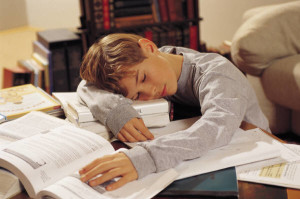News and Notes from The Johnson Center
Refresh Your Sleep Schedule for Back-to-School
JCCHD | Tue, August 26, 2014 | [Healthcare]Back to school time is here and after a summer of staying up late and sleeping in, children can have a hard time adjusting to school’s early start time. Not only is it not much fun to be tired during the day, it can also affect academic performance. Studies show that too little sleep can cause an inability to concentrate, dozing off in class, behavioral issues, and lower level social skills. Persistent sleeping problems are associated with learning difficulties. One study demonstrated that as little as 25 minutes of less sleep a night can cause poorer grades. Students who received “C” and “D” marks went to bed on average 40 minutes later than “A” and “B” students. The good news is there are a few, easy steps parents and kids can take to ensure a better night’s sleep.
It is a good idea to begin adjusting your child’s sleep habits about two weeks before school starts. Going to bed 15 minutes earlier each day until the desired bedtime is reached is recommended. This allows children to adjust gradually and ensure a smooth transition to better sleep habits. Make sure nighttime routines are consistent. For example, you may want to have your child get into their PJ’s, brush their teeth, and then read a story before bed every night. This allows the child to associate a pattern of activities with sleepiness. A child’s room should be cool, quiet and comfortable. It should also be free of distractions, especially screens, like TVs, computers, phones, and video games.

During the day you want to make sure your child limits the amount of non-sleep activities he or she does in their bed. For example, it’s better for a child to study or read at a desk or couch than in their bed because then the bed becomes associated with wakefulness rather than sleep. You also want to make sure to limit the amount of caffeine (tea, chocolate, and soda) your child has, especially in the afternoon and evening. Caffeine can cause children to have trouble falling asleep and can lead to more restless sleep. Lastly, eating a healthy diet and exercising daily can help your child have a good night’s sleep.
By following these tips your child will be able to refresh their sleeping habits and start the school year off right!



